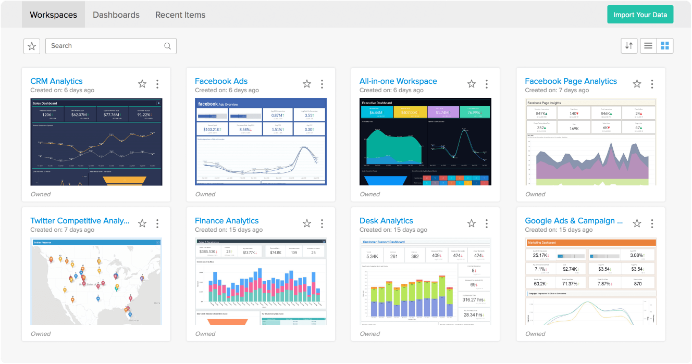Data has become the fuel of the digital economy as it helps market leaders make better strategic decisions that drive operational efficiency, create new market opportunities, improve performance, reduce costs, and increase the business bottom line. This is why today’s smart organizations are employing business intelligence (BI) initiatives and investing in cutting-edge software solutions to help them effectively manage, organize, analyze, and turn large volumes of data into insightful information.
Recognizing the transformative power of data in terms of creating bigger business value, Zoho Corporation, the leading provider of cloud-based business tools and information technology solutions, is helping companies capture, analyze, and process large volumes of data and transform these into actionable information. Through Zoho Analytics, the company’s Software-as-a-Service (SaaS) business intelligence and analytics platform, small and midsize enterprises can achieve better business outcomes by delivering strategic insight at the moment of action.
SourceForge had the opportunity to speak with Clarence Rozario, the Director of Product Management at Zoho Corporation, to discuss the challenges as well as the advantages of implementing business intelligence initiatives. Rozario also shared with us how Zoho Analytics empowers organizations to gain actionable insights from valuable business data.
Top Challenges Organizations Face with Data
The advancement in information technology has made it possible for organizations to amass large volumes of data from multiple sources, whether it’s external, internal, or both through their businesses processes. But with the amount of data growing exponentially at a rapid rate, many businesses are struggling to make sense of complex data.
According to Rozario, some of the biggest data challenges faced by today’s businesses include:
handling big data;
- using the spreadsheet as an analytics tool;
- getting a single version of the truth;
- viewing the important business metrics (KPIs) at a glance;
- using artificial intelligence (AI) and machine learning (ML) to help analyze data;
- having a deeper analysis of data held in different SaaS business apps;
- getting insights that are actionable;
- combining data from different sources for cross-functional analytics; and
- enabling collaborative analysis as well as forcing proper security controls.
For companies that want to remain competitive, it is essential to acknowledge and address these challenges in order to efficiently manage, organize, collect, and analyze these large volumes of data and turn them into insightful information. Fortunately, several initiatives exist to overcome the issues in handling complex data. Among these are delivering and implementing effective business intelligence initiative and leveraging a cutting-edge BI platform.
Implementing a Successful Business Intelligence (BI) Initiative

Clarence Rozario, the Director of Product Management at Zoho Corporation
According to Rozario, in order to benefit from data and gain a competitive advantage, businesses need to focus on making business intelligence a strategic foundation for growth. “Today, businesses are data-driven,” said Rozario. “They require actionable insights based on hard data, and visualization and self-service BI are key to achieving this.” By implementing an effective business intelligence strategy, businesses can enhance the visibility of their organization’s core components, improve control over their important processes, and gain valuable insights into their customers’ behavior.
Although implementing a company-wide BI and analytics strategy can be a daunting task, when deployed and used correctly, its benefits can be significant in achieving business goals. Hence, in order to ensure a successful BI strategy, organizations should leverage an innovative BI and analytics platform that delivers agility and AI-assisted self-service analytics such as Zoho Analytics.
Optimizing Business Performance with Zoho Analytics
Purpose-built for small and mid-size businesses, Zoho Analytics enables users to improve business performance, manage operational costs, and gain competitive advantage. From individuals to collaborative teams, everyone can take advantage of Zoho Analytics for their business intelligence, reporting, and analytics needs.
Key features and capabilities of Zoho Analytics include:
- Supports data analysis from a plethora of data sources, ranging from flat files (CSV, XLSX, HTML, etc.) and web feeds, to offline, online, relational, or non-relational databases as well as cloud storage and cloud applications.
- Offers a wide variety of reporting components and visualization options – charts, geo-maps, pivot tables, summary and/or tabular views, KPI widgets, dashboards with custom themes, and more.
- Shares reports and dashboards online (no need to export as static files) with fine-grained access control options.
- Delivers interactive and dynamic reports and dashboards to enable deep analytics. Viewers also have the options to slice and dice, drill-down, and view underlying data.
- Supports publishing and embedding (within website, blog, intranet, app) options.
- Provides full-blown white label solutions, both SSO (single sign-on) and non-SSO.
- Makes user security and privacy a top priority. “With laws like GDPR coming into effect, it is now paramount that user data is secure at all times,” said Rozario. “Zoho has a separate security team of experts who are constantly working on keeping Zoho’s apps (including Zoho Analytics) and customer data safe and secure.”
Why Use Zoho Analytics
Aside from the aforementioned features and capabilities of Zoho Analytics, Rozario believes that there are six unique points that make this business intelligence and analytics platform a standout from other solutions:
- Short learning curve. Typically, BI tools are known for having a complex user interface (UI). But the spreadsheet-like interface of tables and the drag-and-drop report designer of Zoho Analytics is easy to navigate and user-friendly, promoting an easy and seamless user experience and enabling a short learning curve.
- App integrations. Zoho Analytics integrates with a wide range of business apps through data connectors. These connectors come with a valuable set of ready-made reports and dashboards. You can also blend data across these apps to perform cross-functional analytics, thereby providing complete insight into your business processes and enhancing the return on investment (ROI).
- AI assistant. Zoho Analytics has Zia, the intelligent analytical assistant, which understands questions asked in natural language (for example, ‘What was my sales across products, and across countries over the years?’ and comes up with the relevant reports. Zia eliminates the need to learn SQL to query complex data.
- Easier collaboration. Zoho Analytics promotes efficient online sharing and collaborative analysis with fine-grained access control permissions. These access control systems enable users to share a dashboard, chart, table, or any report with necessary permissions and work on the same data, analyze this, and generate reports to help businesses make an informed decision efficiently.
- Cloud-based solution. Zoho Analytics has been built for the cloud from the ground up. This only means that there are no installable plugins required for data connection and for creating reports.
- Web application programming interfaces (APIs). Zoho Analytics offers a very good set of APIs to do CRUD operations. The HTTP based REST APIs of Zoho Analytics also deliver a true SaaS business intelligence solution on the web.
- Affordable cost. Zoho Analytics has a generous free edition and the paid editions are affordably priced for even small businesses to subscribe to.
Additionally, Zoho Analytics enables businesses to analyze data from any source. “Not just flat files, Zoho Analytics can connect with local and cloud databases,” said Rozario. “And we offer connectors to popular business apps ranging from Zoho CRM, Salesforce CRM, Zendesk, QuickBooks, MailChimp, SurveyMonkey, and more.”
“Any business using one or more of these apps can have their data analyzed using Zoho Analytics,” continued Rozario. “We don’t charge anything extra. Subscribing to our $25 per month plan, you can connect to any number of business apps.”
The Future of Business Intelligence and Analytics
With the advent of digital transformation and the continuous innovation in the industry, the future of business intelligence as a whole is bright. According to Rozario, these are the dynamics or trends that will shake the future of the business intelligence and analytics industry.
First is the growing adoption of self-service and mobile business intelligence as well as machine learning and/or deep learning. Next, the declining use of spreadsheets for analytics and the increasing utilization of embedded analytics. “Small and medium businesses aren’t satisfied with using spreadsheets for analytics,” said Rozario. “They want their data analyzed using a BI and analytics tool, preferably in the cloud. For wider consumption of data, customers also want easier publishing options, including embedded analytics (contextually integrating reports and dashboards within their apps).”
“Businesses also use different apps for sales, marketing, finance, helpdesk, and human resource,” continued Rozario. “And they want to dig into the data each of these apps hold. They are looking for a BI and analytics app to slice and dice this data further. Not just to analyze each app’s data separately, but to get them analyzed together and to see if they can glean some insight, putting them all together.”
Lastly, BI and analytics vendors would have to provide hybrid solutions as enterprises will use a mix of data sources from both on-premises and the cloud.
About Zoho Corporation
 Zoho Corporation, formerly AdventNet, was established in 1996. Headquartered in Pleasanton, California, this privately-held company changed its name from AdventNet to Zoho Corporation in 2009. Zoho Corporation started with a network management platform called Web NMS that served the telecom OEM market. After the dotcom bust, the company diversified to cater to the information technology (IT) administrators with its ManageEngine suite of products. In 2005, Zoho Corporation joined the Software-as-a-Service (SaaS) market with the Zoho.com offerings. Currently, these three brands make up Zoho Corporation.
Zoho Corporation, formerly AdventNet, was established in 1996. Headquartered in Pleasanton, California, this privately-held company changed its name from AdventNet to Zoho Corporation in 2009. Zoho Corporation started with a network management platform called Web NMS that served the telecom OEM market. After the dotcom bust, the company diversified to cater to the information technology (IT) administrators with its ManageEngine suite of products. In 2005, Zoho Corporation joined the Software-as-a-Service (SaaS) market with the Zoho.com offerings. Currently, these three brands make up Zoho Corporation.
